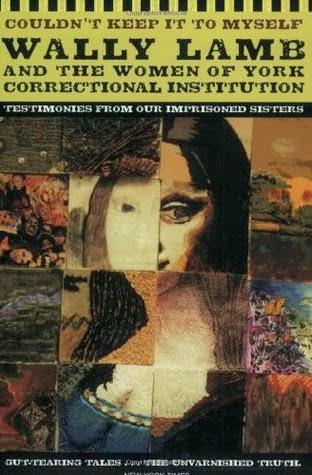 I just finished the book Couldn't Keep it to Myself: Testimonies from our Imprisoned Sisters by Wally Lamb and the Women of York Correctional Institute, and I can't stop thinking about the book, and prisons, and power. One morning I was lying in bed pushing the snooze button more times than I care to admit, and I kept hearing pieces of this interview that finally made me stop pushing the snooze button. It was a man talking about visiting a women's prison and running a writing group. It became clear that he was a well-known writer, but I didn't find out who he was until the end of the interview, when I already knew I was going to have to read this book. I haven't read anything written by Wally Lamb, but at this point I would willingly be his slave in any capacity required.
I just finished the book Couldn't Keep it to Myself: Testimonies from our Imprisoned Sisters by Wally Lamb and the Women of York Correctional Institute, and I can't stop thinking about the book, and prisons, and power. One morning I was lying in bed pushing the snooze button more times than I care to admit, and I kept hearing pieces of this interview that finally made me stop pushing the snooze button. It was a man talking about visiting a women's prison and running a writing group. It became clear that he was a well-known writer, but I didn't find out who he was until the end of the interview, when I already knew I was going to have to read this book. I haven't read anything written by Wally Lamb, but at this point I would willingly be his slave in any capacity required.Lamb was asked to visit the prison and speak to the women after a rash of suicides and a cutting back of educational programs. A single visit turned into a bi-monthly (bi-weekly? whatever means he went every second week) writing program, which eventually resulted in this book.
It's not the kind of book that makes you want to pull quotes out and marvel over them; these aren't the kinds of stories that hinge on well-turned phrases and poetic imagery. It's the kind of book that sits heavily on your heart, or maybe in your gut, as a kind of sick sadness. I wasn't sure what to expect, and I admit I was probably ready with a bit of knee-jerk judgement -- how were these women going to attempt to justify their crimes, and would it be in any way convincing? That wasn't it at all, though. They were just telling their stories, after a lifetime of not believing that their stories were worth telling, or that anyone would listen or care. The matter-of-fact litanies of abuse and neglect and fear and powerlessness filled me up until I had to stop reading for a bit and digest it all. I think the central image that has stayed with me from this book is power, and the lack of it. After being taught repeatedly by parents or partners that they were worthless objects, useful only as objects for mistreatment by or gratification of others, what chance did these women really have?
It's frustrating in a way, feeling so moved by this book and not really seeing how to act on it. It's not prescriptive in any way, it's not telling you to do something. I guess it shows, in a way, how important witnessing (testimony, like the title says) can be. I do believe in personal responsibility, and I agree that having a crappy childhood doesn't give you a free pass to commit crimes and get away with them. And I understand also that agencies like the Children's Aid are overworked and it's easier to judge their performance than offer solutions. So I don't have any grand "after this book I will now..." pronouncements to offer. But a greater awareness of power distribution in our society is not a bad thing, I think.
The use and abuse of power was brutally emphasized by the way in which the state of Connecticut and the prison administration reacted to the publication of this book. Lamb was careful to inform everyone of the book's acceptance and release, but the authorities waited until just before the book came out, and then used some vaguely-worded seldom-enforced law to charge the inmates for their prison stays. The advance for the book was split among the writers, which amounted to about $5000 a person, and most of them were being asked for hundreds of thousands of dollars ($117 a day). Nice, huh? Clearly, it was not acceptable for these women to discover a voice and achieve some success; they needed to be shown their place. After one of the writers was nominated for and won an award given by PEN, an organization that campaigns for imprisoned writers all over the world, the prison cancelled the writing program and deleted all the women's writing that was contained in prison computers. Can you believe the ham-handed punitive immaturity of it all? 60 Minutes got involved and then somehow the writing program was mysteriously restored and the women only had to pay a nominal amount for their prison stay.
I was talking to a friend about this book and she mentioned the absolute wrongness of women's prisons being staffed by male guards -- talk about the potential and likelihood of abuse of power. Several of the essays also mention the emphasis of correctional institutes being taken off of rehabilitation and put on punishment. I understand the view that prison should not be a 'country club', but how can we think that locking people up and treating them like animals unworthy of respect or kindness is going to result in anything positive? Is it not better to allow them education and some degree of autonomy and self-respect, in the hopes that they will be contributing members of society when they are released? That sounds canned and sappy, and I can't figure out a better way to say it.



4 comments:
"how can we think that locking people up and treating them like animals unworthy of respect or kindness is going to result in anything positive?"
Hear hear! I can't believe how the correctional institution reacted. Isn't it a good thing if inmates are turning their lives around? Isn't that sort of the intention? I would really hope that someone who ends up in prison can use that time to a positive end. And treating them badly or impeding their success is hardly the way to do that. Particularly if these women will one day be released (as I assume most are), it's better for everyone if they have something going for them on release.
I really enjoy Wally Lamb, but have not read this book. I will have to put it on my list after reading your review!
Wally Lamb is the author that got me reading again after many many years. I really enjoyed 'She's come undone' and 'I know this much is true'. Honestly, I hadn't finished a book in over 10 years and this man actually engaged me enough to finish a book and give me hope that there were more out there. I'm currently reading his latest book, which has been very good. Now I'm going to have to go find this one! I didn't realize it would be that good - I thought it was just a series of interviews. Thanks!!
I will probably comment on this blog in a couple of months. I wanted to let you know that I am reading Lamb: The Gospel According to Biff - and I love it. Great suggestion - plus my whole book club is reading it for next month on my suggestion on your suggestio. I hope you are enjoying your Ophrah like powers to influence a book's sucess. I was late dropping the kids off this morning 'cause I was reading it while trying to clean my teeth. So now I am going to give to read Prisons and Power. I've read one of Wally Lamb's books (there was a fat girl with beautiful hair and a whale) - it was extremely powerful and sad. I think he has a real affinity for the downtrodden. I worked for the Elizabeth Fry Society one summer and the thing I learned was that the women I dealt with were really ordinary but as a rule came from really crappy situations and often had very poor impulse control - they were mostly teenagers. But they sure weren't bad or evil. Z
Post a Comment